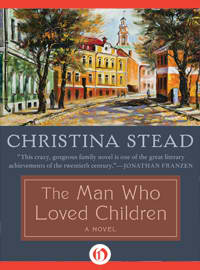The Man Who Loved Children by Christina Stead
 Sunday, December 23, 2012 at 7:05PM
Sunday, December 23, 2012 at 7:05PM 
First published in Australia in 1940; published digitally by Open Road Media on October 23, 2012
Henny, a character in The Man Who Loved Children, condemns every popular novel she reads as "silly rot, muck, and a lot of hooey." Perhaps Christina Stead wrote The Man Who Loved Children as an antidote to the popular novel. Its strength is the depth of its characters, yet the two most significant characters are so disagreeable that the book will never warm a reader's heart. By writing a novel with no likable characters and little plot, Stead shunned the formula for popularity. She nonetheless managed to craft a book worth reading, although you might cringe a few times before reaching the end and sigh with relief when you've finally conquered it.
To an outsider, living with the Pollitt family would be a maddening experience. Reading about the Pollitt family, on the other hand, is like watching a volcano that is about to erupt and destroy a village. The sense of impending horror is so strong I could only manage it in small doses. The parents are fascinating but repellent, a husband and wife who, wielding words as weapons, seem destined not just to destroy each other, but to bring about the metaphorical (and perhaps literal) annihilation of their entire family.
Sam and Henny deserve each other. Their blistering arguments make George and Martha of Who's Afraid of Virginia Woolf? seem like Romeo and Juliet. Henny is a harridan, a "brackish well of hate." She is the queen of all drama queens. When she isn't promising to poison herself, she's threatening to beat all the children to death. She regards life "as a series of piracies of all powers." She is a compulsive and secretive borrower and spender. Although she hates Sam, Henny revels in the knowledge that "the dread power of wifehood" compels him to stay with her.
Sam is Henny's superficially cheerful opposite -- optimistic, full of love for his children -- yet at his core, there is little to distinguish Sam from Henny. Sam regards his marriage as years spent in "mental rot and spiritual death." He complains that he only wants to be understood, yet Henny understands him perfectly. Sam is, she says, "the great I-Am." Sam fancies himself the perfect husband and father while continually berating Henny and calling his daughter Louie a "great fat lump." Sam claims to be in love with his fellow man, yet he advocates eugenics and rules his own house with a tyrannical intolerance of individuality.
In addition to Louie (eleven when the novel begins, fourteen when it ends), who was born to Sam's first wife before she died, Sam and Henny have five children (Henny gives birth to another during the course of the novel). Sam believes his "great fitness is to be a leader of children." He thinks he is "teaching them to be good men and women" while "a woman was always twisting them, snatching them away from him." Sam doesn't want his children to grow up. He insists that Louie should stay with him forever. As the family descends into poverty, Sam barely notices. He wants more children.
Sam speaks a language that is all his own, a mixture of mispronunciations, rhymes, and gibberish that outsiders would regard as a foreign tongue. The language bonds his children to Sam while isolating them from neighbors and friends.
Sam's relationship with Louie is a little creepy. He is fascinated by "the mystery of female adolescence of which, in his prim boyhood, he had been ignorant." At the same time, he views himself as her guardian against impure influences. Sam wants to shelter Louie from the debauchery of dancing lessons and fine dresses. He views it as his duty to protect all his children from "filthy thoughts." The reader wonders whether Sam is trying to shelter himself from those thoughts, particularly with regard to Louie.
Louie is a moody girl who labors to constrain her inner beast. Although Sam forbids the reading of novels, Louie spends every free moment with books. She writes plays and sonnets, sometimes in languages that she invents. Louie is the only child who can see her father for the windbag he is. When the other children revel in Sam's silly rhymes about the neighbors, she lodges futile objections to his rudeness. Louie is so desperate for real love that she befriends wretched neighbors and begins writing love poetry to her teacher, Miss Aiden. Her other passion is for her friend Clare, who joins her "in days of mad fervor about nothing at all."
The novel follows the Pollits through setbacks and tribulations. Unfortunate characters litter the novel, including Sam's batty sisters and destitute in-laws. Sam's job takes him to Malaysia; his return ten months later is greeted with the birth of yet another child. Sam eventually loses his job, leading to the family's gradual decline into poverty. To the extent that the novel has a plot, it revolves around Henny's response to the family's financial decline, and the reactions of Sam and Louie to Henny.
I did not quickly adapt to the rambling, meandering, quirky style in which The Man Who Loved Children is written, although I eventually came to appreciate it. I did not ever warm to the sullen, broken, hypocritical characters who populate the novel, although I eventually came to admire the skill with which they are constructed, and to feel some sympathy for Louie. Despite its inevitability, the novel's denouement is both shocking and horrifying. For its unforgettable characters and often startling prose, I am glad I read The Man Who Loved Children, but I wouldn't want to read it again.
RECOMMENDED
Reader Comments